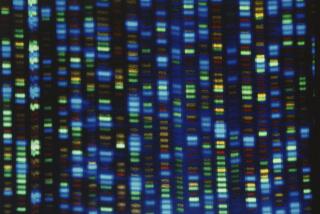New Genes, a New Human Nature-- and New Dangers
- Share via
As teenagers about to graduate from high school many years ago, a friend and I were allowed to stand righteously at the pulpit before our church congregation and rave on about our elders’ mishandling of current events. Their failures--racism, the Vietnam War, the flammability of the Cuyahoga River--were egregious and reflected basic human defects, we opined. Our solution? Change human nature.
It seemed like a good idea at the time. But now that the actual possibility of changing human nature looms before us, I’m not so sure.
The decoding of the human genome and the rapidly evolving technologies of genetic manipulation open doors to scientists that, until now, were largely closed to all but God or natural selection. Almost daily we read of breakthroughs in genetic technologies, many of which tantalize with the promise of disease prevention and cure. But others raise profound social and political concerns. Two technologies, reproductive cloning and inheritable genetic modification, are so unsettling that they demand immediate, societywide scrutiny and debate.
Reproductive cloning--or making a genetic duplicate--is already familiar enough, thanks to the story of Dolly the sheep, to have bred contempt. Apart from the moral issues--the degradation of human autonomy and individuality--the statistics are not comforting. Data gathered by Scottish scientist Ian Wilmut, Dolly’s “father,” suggest that it takes about 116 cloned eggs to produce one live-born offspring. Most of the offspring suffer from serious defects. There is no reason to expect human clones to fare any better.
Reproductive cloning of humans is banned in more than 30 countries, though not yet in the U.S.
Even more Faustian dangers are posed by inheritable genetic modification, or IGM. This process changes the genes in eggs, sperm or embryos to produce certain traits in an organism that are then passed on to its descendants.
IGM has not yet been tried on humans. People sometimes assume that it might offer the hope of “fixing” inherited afflictions such as Tay-Sachs disease and cystic fibrosis. But other methods that don’t require gene manipulation can more easily address these problems.
The real attraction of IGM for the scientists promoting it is the possibility of engineering humans to specification--”designer babies.” Some envision, and even appear to welcome, a world in which the human species has split into the “GenRich” and the “Naturals,” genetic castes so divergent as to preclude interbreeding. It’s not hard to imagine the perniciousness of the resulting social order.
The dreams of human perfectibility were disturbing enough when the tools available were crude. Now new tools are emerging that promise far greater precision, but human motives and impulses have not evolved apace. Those most eager to pursue IGM seem no more enlightened than Oliver Wendell Holmes Jr. when he wrote, in a Supreme Court decision upholding Virginia’s forced-sterilization law, that “it is better for all the world, if instead of waiting to execute degenerate offspring for crime, or to let them starve for their imbecility, society can prevent those who are manifestly unfit from continuing their kind.”
All this argues not for the panicked suppression of all genetic technologies but for firm restraint while we educate ourselves about them.
Yet events are rushing far ahead of the debate and threaten to race out of control. The U.S. Patent Office began accepting patent applications for sections of human DNA years ago; several million are pending. The time when clinics begin running newspaper ads offering customized offspring may not be that far off.
Congress and many states are grappling with cloning-ban proposals, though no politicians are talking about IGM yet. Indeed, only a few narrow constituencies have weighed in on these matters. What about the rest of us?
Genetic technologies could transform human nature, and nothing affects us all more than that. We must engage this issue now, or soon we will open the door to the harsh glare of a brave new world to which we did not consent.
*
Thomas Prugh is senior editor for World Watch magazine.






